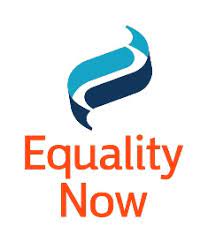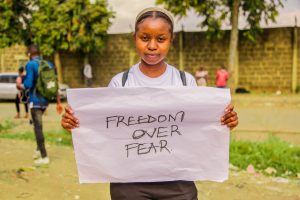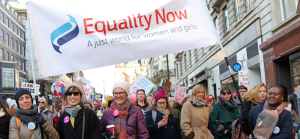
Together Women Rise has awarded a Transformation Partnership Grant in the amount of $100,000 per year for two years (2023 and 2024) to support Equality Now’s work to achieve legal gender equality, end harmful practices, end sexual violence, and end sexual exploitation.
Since its founding in 1992, Equality Now has been a global leader in using the law to create a just world for women and girls. With expertise in human rights, sex discriminatory laws, and legislative change, Equality Now’s international network of lawyers, activists, and supporters challenges ingrained cultural assumptions and calls out gender inequality wherever it exists.
Social change often begins with legal change so Equality Now uses the power of the law to create enduring equality for women and girls. Their mission is to achieve legal and systemic change that addresses violence and discrimination against women and girls around the world. In the last 30 years, their team has worked in over half of the world’s countries, with thousands of partners.
Partners and Collaborators
Equality Now partners with 133 grassroots women’s groups in 36 countries and are a member and convener of multiple coalitions.
 Major Areas of Focus:
Major Areas of Focus:
Achieving Legal Equality
• Reforming Discriminatory Laws: Challenging sex discrimination in laws, from family law to laws that shield perpetrators of gender-based violence and discrimination.
• Embedding Constitutional Equality: Ensuring constitutions prohibit discrimination on the basis of sex and gender, including the Equal Rights Amendment in the US.
Ending Harmful Practices
• Ending Female Genital Mutilation/Cutting (FGM/Cutting): Every year, at least 3 million girls are at risk of undergoing FGM/C across every region of the world. Equality Now has been a leading voice on this issue since 1992.
• Ending Child Marriage: Marrying of children is still allowed in 117 countries, and in 43 states across the US. Equality Now advocates for a minimum age of marriage to be 18, with no exceptions.
Ending Sexual Violence
• Securing Progressive Laws: Defining and campaigning for laws based on consent that reflect the true nature of sexual violence and are informed by the experiences of survivors.
• Supporting Effective Implementation: Working together with law enforcement and the judiciary to ensure laws deliver justice for victims/survivors.
Ending Sexual Exploitation
• Ending Human Trafficking: Championing an ecosystems approach to laws against trafficking and exploitation, to protect women & girls from this human rights violation.
• Championing Digital Rights: Campaigning for international standards that define digital rights as human rights, and protect women and girls from online sexual exploitation and abuse.
How Equality Now Advances Systems Change
Almost every country in the world has laws that treat women and girls as second-class citizens. Women and girls are denied equal access to rights, resources, services and opportunities, dignity, and worth. This inequality makes them vulnerable to dependency, exploitation, poverty, abuse, and violence. Research shows that where women and girls are treated unfairly, there is more societal conflict and less economic stability.
To make gender equality a reality, Equality Now uses four pathways to create lasting systemic change:
• Legal Pathway: It works to ensure laws are created and implemented to treat men and women equally and address all forms of violence against women and girls. It does this through legal analysis, strategic litigation, and international treaties, conventions, and standards.
• Advocacy Pathway: It amplifies the voices of activists, influencers, and artists to engage the public, social and broadcast media, and governments so it can influence public awareness and attitudes, build strong constituencies, hold governments accountable, and ultimately, affect change.
• Collaboration Pathway: Change must come from the ground up, so Equality Now partners with and provide support to advocates and groups on the ground and help them take collective action to hold their governments to account.
• Resourcing Pathway: It works to influence those with resources to support the women’s rights sector. To change the systems that repress women and girls, we need a fully capitalized women’s sector.
Examples of Equality Now’s Work/Current Initiatives
Sexual Violence: Mariam’s Story
Equality Now has worked with the legal community in Pakistan to combat sexual violence and reform laws and policies to protect victims in and outside the courtroom.
When Mariam was 15, she was raped by her father. She told the police, but they did not take her seriously. They badgered, ridiculed, and saddled her with guilt. Mariam and her mother knew they wouldn’t get far with the police, so her maternal uncle hired a lawyer. Mariam’s father was eventually arrested, but he quickly persuaded the magistrate to release him on bail. No one told Mariam about the bail hearing, so she did not have an opportunity to challenge it. Then the prosecutor got the police to drop Mariam’s case because of lack of evidence. Even with these challenges, Mariam did not lose hope. She says: “The whole process was very difficult. I was scared that people would not trust me. They would blame me, call me a liar, ask how it was possible that my father could do such a thing. If something like that happens, we should not lose their heart. We should face it bravely and courageously like I am doing.”
Equality Now heard of Mariam’s case through its partner War Against Rape (WAR) in Lahore. With no laws specifically against incest, it secured a new lawyer pro-bono who convinced the police to reopen the investigation and had the prosecutor suspended for misconduct.
Mariam’s case provided a blueprint for the path forward to secure justice for rape and incest victims. Equality Now issued a report—the first of its kind— describing how cases of this nature are handled in the legal system in Pakistan. Through Mariam’s case, Equality Now helped change legal procedures in Pakistan— from ensuring young victims do not need to testify in front of their abusers to expediting trials for rape victims. It contributed to the legal reform process when the government changed its rape laws in 2016, which included higher penalties, provisions for services to survivors, and speedy trials. This change will help future victims avoid many of the crippling hurdles faced by Mariam.
Female Genital Mutilation/Cutting
Despite FGM/C being a human rights violation, it is estimated that at least 200 million girls have been subject to the harmful practice—leading to severe physical and psychological pain, infertility, and death.
For many years, governments have been reluctant to address FGM/C because of its roots in tradition. At the same time, activists have sought to make it clear that FGM/C is not a religious requirement and that it is rooted in patriarchal systems.
Equality Now’s efforts to end FGM/C demonstrates how it creates enduring change. Equality Now pressured UNICEF to take on FGM/C as an abuse of human rights in 1993. This led to a global shift in the recognition of FGM/C as a human rights issue and not a cultural practice. It also contributed to an increase in UN funding to end FGM/C and, in 2008, UNICEF and the United Nations Population Fund (UNFPA) launched a joint program to end the practice.
Equality Now has been working with activists to pass anti FGM/C laws wherever it is practiced.
In 2020, it released the first global report that called for a global response to FGM/C, which shone a light on the prevalence of FGM/C and the gaps in legislation in 90 countries around the world. Equality Now has engaged in strategic litigation cases on FGM/C in Egypt, Liberia, Burkina Faso, Kenya, and the United States, which led to the first-ever convictions for FGM/C. In 2021, Equality Now engaged in a court case to defend the constitutionality of the Kenyan FGM/C law and won, securing the rights of Kenyan women and girls to be protected from FGM/C.
